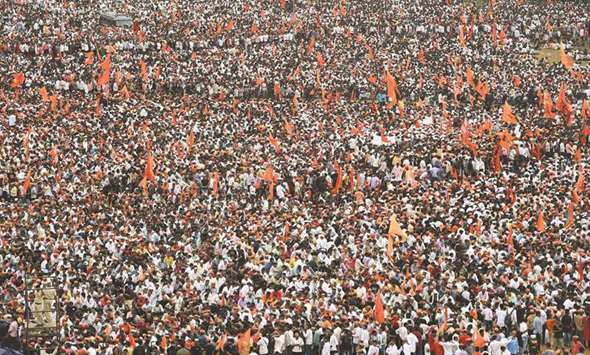An estimated half a million protesters brought Mumbai to a halt yesterday as they demanded quotas for government jobs and colleges amid unemployment and reduced farm incomes.
Many businesses in the southern part of Mumbai were closed and traffic was diverted as the protesters, largely from rural areas of Maharashtra state, descended on India’s financial capital in a sea of saffron flags and banners.
Organisers put the number of protesters at more than 2mn and said it was the largest rally ever staged in the city of 20mn.
Media estimated the number of people at the rally between 600,000 and about 1mn.
A spokesperson from Mumbai police said an estimated 500,000 people participated in the march, which brought rail and roads to a standstill as protesters from the Maratha community pressed their demands.
“We want reservations for the Maratha community in government jobs, educational institutes, and better farm loan waivers,” Bhaiya Patil, one of the organisers said.
The city’s famed ‘dabbawalas’, who deliver packed lunches to people working in offices across Mumbai, suspended operations for the day, as did schools in the affected area.
The ‘mook morcha’ (silent procession) started from the Byculla Zoo and terminated at the historic Azad Maidan – a distance of around 6km.
While the majority were on foot, there were some adventurous Marathas who came on bicycles and some others riding horses, a few even dressed like Chhatrapati Shivaji Maharaj – the idol of all Maharashtrians.
Several top leaders of various political parties, including former chief ministers Narayan Rane and Ashok Chavan, senior Congress and Nationalist Congress Party leaders also joined the procession and interacted with the participants.
In June, the government in Maharashtra agreed to write off loans to farmers estimated to be worth nearly $5bn after 11 days of protests that strangled supplies to Mumbai.
Maharashtra is one of several largely agricultural states that have suffered disappointing rains and crop failures in recent years.
More than 1,417 farmers killed themselves in Maharashtra in 2016, according to official figures.
“Farming is no longer profitable and jobs are not available,” said one protester, Pradip Munde, a farmer from Osmanabad, a town more than 400km southeast of Mumbai.
“Reservation can ensure us better education and jobs.”
Demands for quotas for highly sought-after government jobs and university places have escalated as unemployment has risen and conditions in rural areas worsened.
India reserves places for lower castes to try to bring victims of the country’s worst discrimination into the mainstream, but the policy causes resentment among other communities, who say it freezes them out.
Marathas, who comprise one-third of Maharashtra state’s 116mn people, are mainly engaged in agriculture and are economically deprived.
But the community is politically powerful with several key leaders active in the state.
Maharashtra’s Chief Minister Devendra Fadnavis responded yesterday with a promise for “regular interaction” with the Maratha community through a committee.
Yesterday’s rally was the concluding protest of a series of 57 marches staged over the past year in Maharashtra by the Maratha community to press its demands.
India has nearly 260mn farmers and farm labourers and over half the population lives in rural areas, but agriculture accounts for just 17% of its gross domestic product.
Farmers around the country have been pressing for more government assistance, often through protests.

Members of the Maratha community take part in a rally in Mumbai yesterday.
